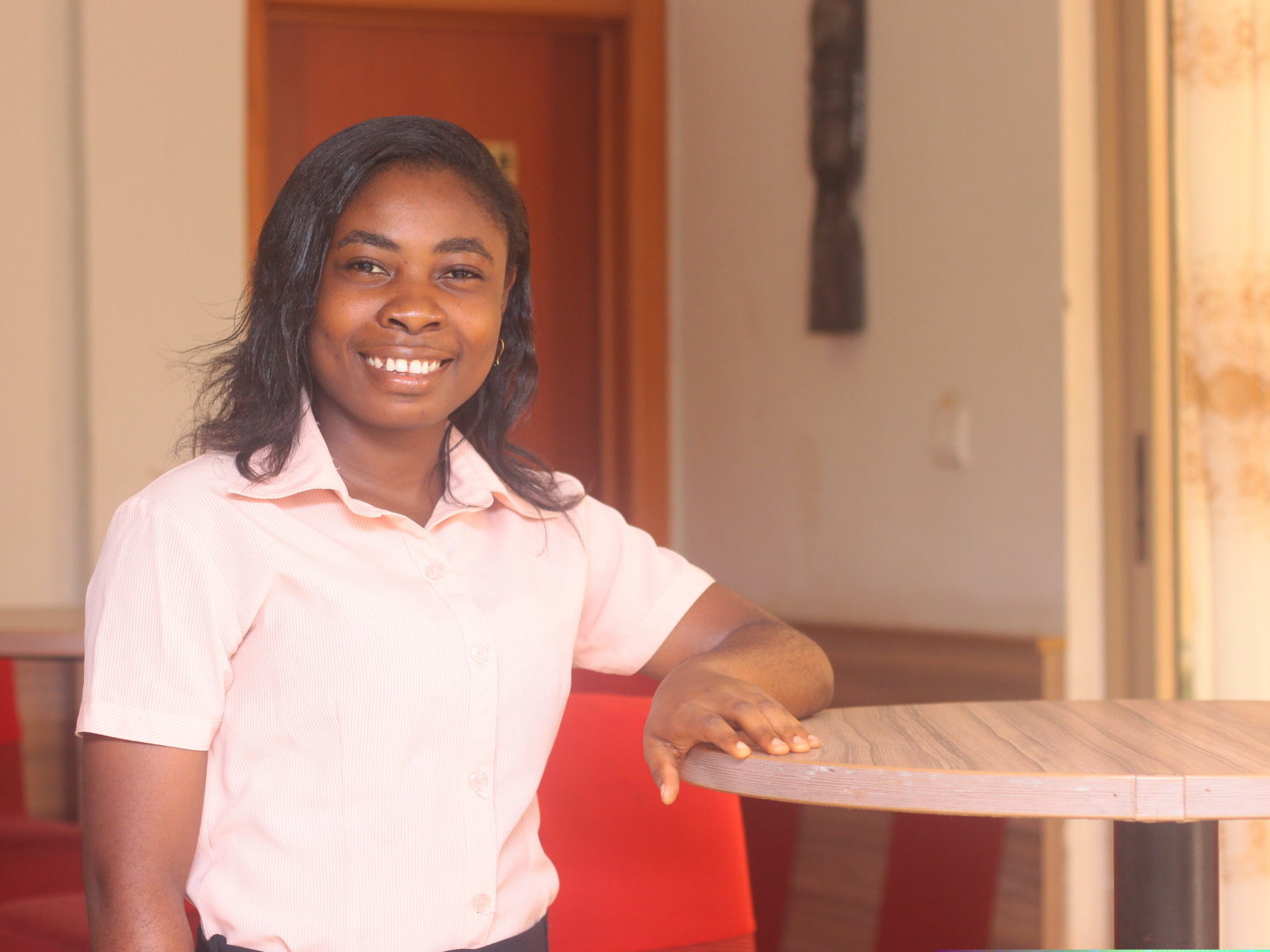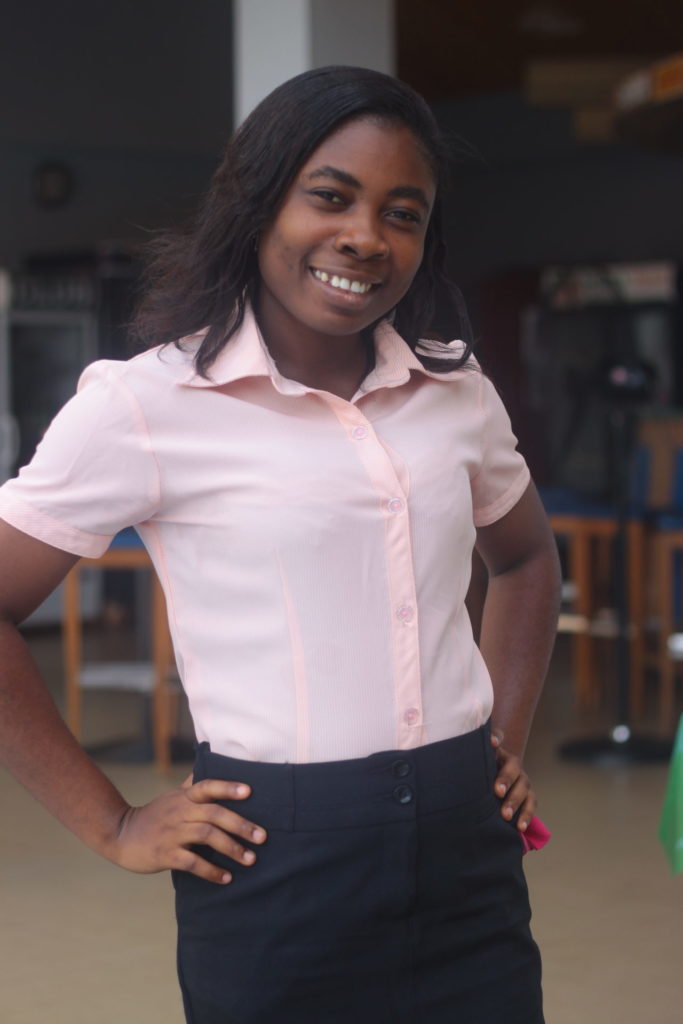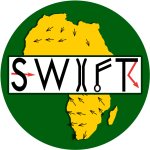
At the start of SWIFT in 2017, Marian Osei was a PhD student carrying out her doctoral research at Kwame Nkrumah University of Science and Technology (KNUST) in Kumasi, Ghana. Through SWIFT she has: published four international papers; led international science collaborations; delivered training to African colleagues across the continent; and is about to embark on a prestigious Royal Society fellowship in the UK.
According to John Marsham, a researcher at the university of Leeds, “Marian’s input into SWIFT has been particularly notable, with several publications published or planned. It was fantastic to see Marian now has funding to spend time at the UK Centre for Ecology and Hydrology, to continue her high quality research, build her skills and network, and input to CEH research.” Leonard Amekudzi, a close colleague of Marian at KNUST, noted that “she is a very hard-working, resourceful and intelligent individual with a high sense of maturity… The African SWIFT project impacted Marian’s training as Marian benefited from early career researchers’ training programmes such as Python programming, nowcasting, and weather forecasting.”
She gives here a personal account of her experience of SWIFT.
I became part of the SWIFT project at the onset of my career and the beginning of my doctoral studies at KNUST in 2017. Prior to SWIFT, I had undertaken my MPhil studies, creating a niche in hydro-meteorology (the study of interactions between the ground and lower atmosphere) and river basin hydrological modelling. However, being part of SWIFT, specifically under the work packages for nowcasting (0-6 hour forecasting) and satellite use, gave me an opportunity to specialise in satellite remote sensing for convection, as well as nowcasting. These topics relate closely to atmospheric and ocean dynamics, areas of climate science in which I had great interest but had not envisioned incorporating in my research career. SWIFT’s work on satellites further exposed me to the use of satellite remote sensing for monitoring atmospheric convection and severe weather forecasting in West Africa.
Being part of SWIFT meant being a strategic thinker in knowing the research gaps associated to my focus area and how to bridge these gaps. For instance, over West Africa, the scarcity of radiosondes (a standard weather balloon system) is a concern when investigating the pre-convective environment of the atmosphere during thunderstorm formation. This led me to probe on the use of alternative satellite-based sounders (tools to measure the state of the environment), such as the application of products from the Atmospheric InfraRed Sounder (AIRS) to improve West African severe weather forecasting. In addition, I was scientific lead in investigation four severe weather case studies, which required posing critical in-depth questions into their evolutions based on their thermodynamical, physical, microphysics and kinematic structure, which otherwise, I had limited prior knowledge of. Based on critical thinking from case studies, I incorporated atmospheric dynamics into my original doctoral dissertation by including the influence of atmospheric water transport, winds, divergence (the process of winds ‘spreading outwards’) and land surface energy partitioning (how the state of the ground affects the weather) on short duration (2-3 day) wet and dry spells at the catchment scale. Thus, my research and thinking skills improved greatly.
The installation of the NWCSAF (satellite based nowcasting) facility at Meteorology and Climate Science unit also granted me the opportunity to use its product in nowcasting storms which affect Ghana. My forecasting skills improved as I worked closely with the Ghana Meteorological Agency (GMet) forecasters during two testbeds – intense forecast development projects bringing together researchers and operational forecasters. Constant collaborations with GMet SWIFT research scientists on case study projects aided my understanding of the role of West African weather controls, thus moving from the theoretical (lecture notes) to the practical (operational forecasting) of weather phenomena in the region. Through SWIFT, I have tremendously increased my python programming skills, which was a real struggle for me at the initial stages of my research. SWIFT gave me the opportunity to participate in the first high-computing training in 2018, provided by Dr. Leif Denby. Since receiving this training, I have made great strides in climate data manipulation using python programming. In 2021, I had the opportunity to collaborate with Dr. Leif Denby, Miss. Maureen Ahiataku and Dr. Jeffrey Aryee to deliver, virtually, training to other upcoming climate researchers who are interested in using python in their daily computations. Thus, I have moved from a participant to a trainer in python programming. The secondment program to GMet from October 2020 to January 2021 offered me a first-hand use of the Weather Research and Forecasting (WRF) numerical weather prediction model. In fact, based on results of my work-package objectives, I am hoping the sounding information from AIRS can be assimilated directly into the WRF model at GMet to improve forecasting over Ghana.

I have always had a passion for teaching, and have been assisting in preparation of lecture materials and teaching since 2014. I have helped my academic mentor (Prof. Leonard K. Amekudzi) to deliver both undergraduate and postgraduate courses in satellite remote sensing, climate systems in sub-Saharan Africa, tropical meteorology, applied meteorology and atmospheric and ocean dynamics. The knowledge gained from satellite remote sensing and case study atmospheric dynamics increased my confidence in tutoring undergraduate students in meteorology and climate science, who often find this course to be very difficult. I made it my ultimate aim to translate the knowledge into easier and simpler theories and methods, citing the applicability of the theories to the real world atmosphere and how they are being used in forecasting in Ghana, thus further enhancing the theory-to-practical based approach. Feedback from the first undergraduates to whom I successfully applied these skills and approach in 2019 showed a better understanding of atmospheric dynamics after the course. Through the SWIFT research experience over the last four years, I have mentored and coached both undergraduates and postgraduates by assigning them to various research topics for their final year projects, which focused on atmospheric dynamics. Research gap identification has helped me to come up with research topics for these students and supervise them successfully.
SWIFT has also shaped my career in time management. Since I was undertaking my doctoral studies at the same time as SWIFT (2017-2021), I have learnt to manage my time efficiently and effectively, ensuring I produce relevant results for objectives in my dissertation and SWIFT deliverables. At the end of 2021, I had successfully written and defended my dissertation, published four manuscripts (three from my dissertation and one under SWIFT) and have three additional papers for SWIFT under peer review. The results of my time management skills also had an impact on being awarded a 6-month (December 2021 – May 2022) postdoctoral contract with the Water Research Institute (WRI), a branch under the Council for Scientific and Industrial Research. At WRI, I have been assigned to the UK-funded EMPOWER (which aims to identify practical pathways for on-the-ground climate change adaptation) and Danish-funded CREAM (which aims to create a knowledge base and capacity for integrating climate change and other future development scenarios into river basin management to enhance climate resilience, livelihood, water-food-energy security, and environmental conservation) projects. Under EMPOWER, my team and I successfully organised two workshops with stakeholders, thus, benefitting from organisational skills from the SWIFT 2019 summer school and 2021 testbed and stakeholder-engagement skills from the 2021 testbed with users.
Finally, the international collaborations and network SWIFT has given me is beyond words. Prof. Douglas Parker in 2018 introduced me to Prof. Craig R. Ferguson (University at Albany), who gave me insight to the AIRS sensor. Together, we have a published manuscript on AIRS and another under peer review on the capabilities of the sounder in capturing moist convective processes over West Africa. With Prof. Ferguson, we put together a proposal on land-atmosphere interactions over West Africa for a NOAA grant, which unfortunately was not successful. However, during the 2019 SWIFT summer school, I had the opportunity to interact with Prof. Christopher Taylor at UK-CEH, who in 2020 had a keen interest in our land-atmosphere proposal. In 2021, he encouraged me to submit the proposal to the Royal Society and Newton Fellowship, with him as a co-applicant, which was successful. I begin this fellowship at UK-CEH in June 2022 to May 2024, providing me an opportunity to continue working with SWIFT UK partners. Overall, the network built with both SWIFT African and UK partners will last a lifetime.
Dr. Marian Amoakowaah Osei
SWIFT Research Scientist
Work-package 3 and 4
KNUST, Ghana
